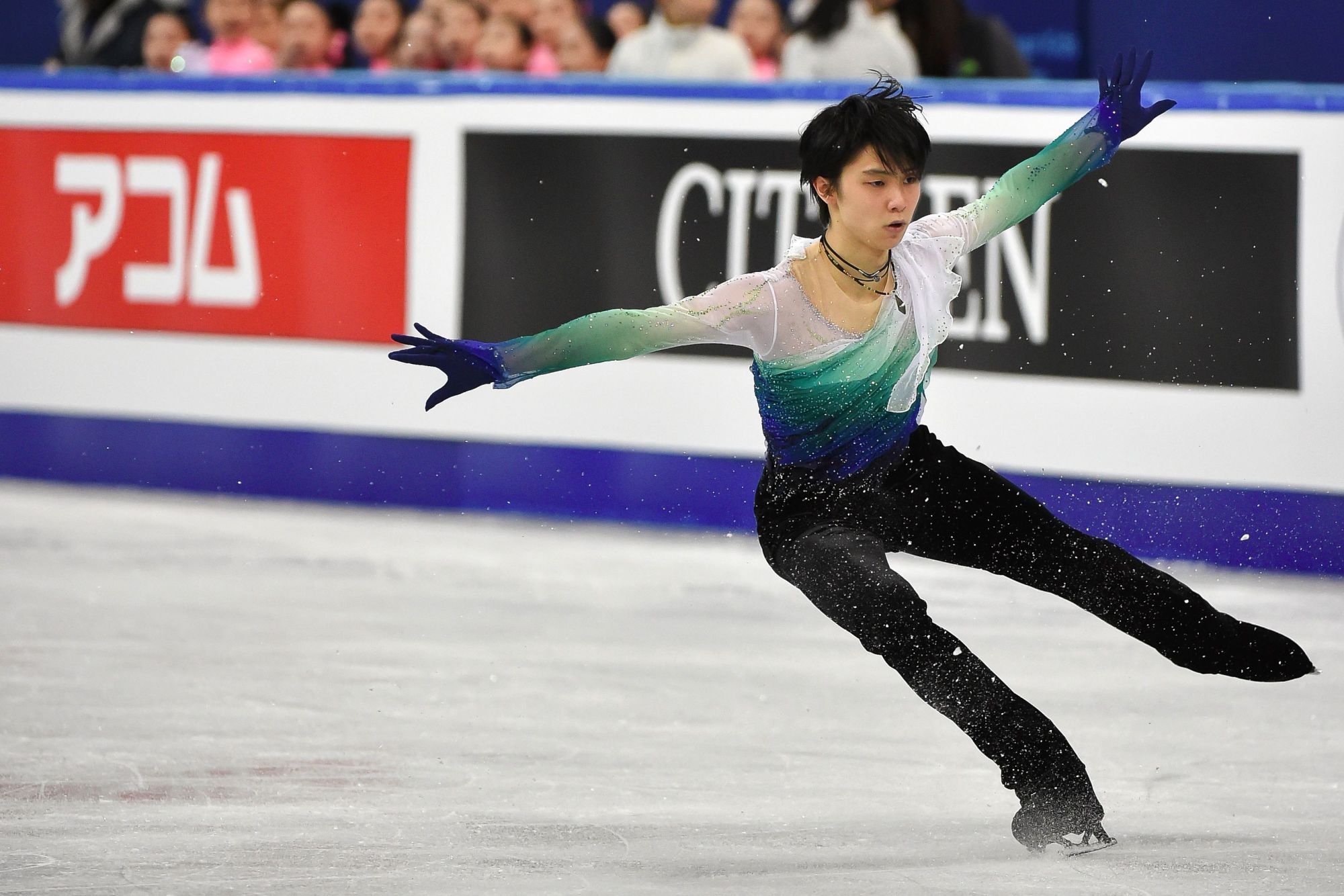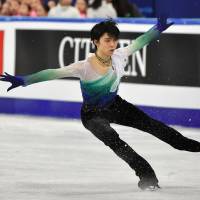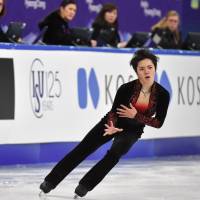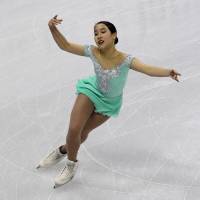It was another successful week for Japan on the international circuit.
A week in which Yuzuru Hanyu does not win may not seem successful to some, but that is not the way Ice Time sees it.
Japan took home half of the singles medals at the Four Continents Championships in South Korea, with Mai Mihara winning her first senior title in stunning fashion, and Hanyu and Shoma Uno collecting the silver and bronze medals, respectively, behind American Nathan Chen.
There is a lot of buzz around Chen now and deservedly so after his showing at the Gangneung Ice Arena, where he landed five quadruple jumps in his free skate to edge Hanyu for the title. Chen's winning margin over the Olympic champion was less than four points (307.46 to 303.71).
Before any panic sets in, fans need to keep in mind that Hanyu did not skate clean in either his short program or free skate. If he had, he almost surely would have won.
Hanyu did claim the free skate with a season-best score (206.67) despite Chen's quintuple quad performance.
Rockerskating's Jackie Wong put the matter in perspective with the following tweet on Sunday:
"Fact is a perfect Hanyu can still beat a perfect Chen this season — technical disadvantage and all . . ."
What I think is worth noting now is that going into next month's world championships in Helsinki, it won't be Hanyu that is under pressure, it will be Chen.
It will be interesting to see how the 17-year-old handles it. Just a couple of months ago it did not really seem like he was in the equation when it came to discussing world title contenders, but here he is.
This may make life a bit easier for Hanyu, who can now be the hunter instead of the hunted for the first time in quite a while. He certainly seemed relaxed afterward.
"I didn't feel so much pressure," Hanyu was quoted as saying by the ISU website following the free skate. "I was trying to feel relaxed and to enjoy the performance I have practiced for so much. I'm very excited about the score, I showed what I had practiced and I am satisfied with what I did. I will practice my quads more to make them perfect and I would like to be more confident in the next competition."
NBC analyst John Coughlin had an interesting take on Hanyu.
"This wasn't the most emotionally connected I have seen him to his performance, but maybe that's something that he needs to do," stated Coughlin. "My knock on him in the past is that he's been almost too emotional. Maybe he needs to become a little more detached in order to become consistent enough to stay on top with these young guns coming up behind him."
Coughlin's fellow NBC analyst Andrea Joyce noted that Hanyu was doing some fact-finding on his first visit to the rink for the 2018 Pyeongchang Games.
"You can't underestimate the importance of him being out there on this Olympic ice in anticipation of the Olympics next year," Joyce said. "He said yesterday (Saturday) that he has been inspecting the temperatures in the arena, the ice conditions. Even how the audio sounds throughout the arena. He's just soaking that all up, preparing himself for next year."
Coughlin clearly admires the way that Hanyu deals with the demands of being the No. 1 skater in the world.
"I would say that the pressure he faces, the media that follows him around, the fan base that follows him around, is unlike any other athlete in the sport at this time," Coughlin noted. "For him to be able to skate under that pressure, is that much more tremendous and impressive."
Uno has quietly put together a very nice season, winning his first senior Japan national crown, earning a second straight bronze medal at the Grand Prix Final, and now the bronze at the Four Continents.
The 19-year-old earned some high praise for his efforts in South Korea.
"He, to me, has some of the best skating skills, the best interpretation. He just seems to have gone a little bit under the radar," said a Eurosport commentator after Uno's free skate, despite the fact Uno fell on both of his triple axels.
"I think Shoma is as much worthy of being tipped to win the gold medal in the Olympics next year as Hanyu or Chen," added the commentator.
Spectacular showing: That about sums up what Mai Mihara achieved at the Four Continents. The 17-year-old displayed great fortitude in defeating this season's U.S. champion (Karen Chen), the Canadian champion (Kaetlyn Osmond) and several skaters who competed in the Olympics.
It is always wonderful to see an athlete really hit their stride for the first time on the big stage, and that is exactly what Mihara did on Saturday.
One of Ice Time's followers on Twitter said it best: "Mai, Mai, Mai."
Fourth after the short program, Mihara fashioned a lovely free skate to "Cinderella" to vault over her fellow competitors and win the gold medal with a personal-best total score of 200.85.
The Kobe native hit seven triple jumps in her free skate and did not receive a single negative grade of execution from any of the nine judges.
"At first I was quite nervous, but I started with a smile and I think I was a very beautiful Cinderella by the end, so I feel glad about that," Mihara told the ISU website. "At first I thought I should do my best to finish the competition with the best I have and I felt the same during the program and at the end I was proud of myself."
The glass slipper is looking pretty good on this young lady. It looks as if midnight may be a ways off.
Mihara's arrival on the big stage comes at exactly the right time, with Satoko Miyahara injured and Japan's shot at retaining three spots in women's singles for the Pyeongchang Games looking very dicey.
If Miyahara can return to full health in time for the worlds, the prospects will look much better for Japan keeping all three places.
Excruciating: That's what it was like watching Wakaba Higuchi after her free skate at the Four Continents. The 16-year-old staggered to a ninth-place finish and really broke down while waiting for her scores afterward.
You had to feel for Higuchi, who came in third and fourth in her two GP assignments this season and was second behind Miyahara at nationals for the second year in a row. She was expecting a much better showing. Higuchi really wears her heart on her sleeve.
The same thing happened last season when she came in second behind Marin Honda at the Junior GP in Zagreb.
There is a reason for those tears. It shows how invested she is in her skating.
Raking them in: While all of the action was taking place at the Four Continents, Japan was racking up several more medals at the Bavarian Open in Oberstdorf, Germany.
Hiroaki Sato and Shu Nakamura finished second and third, respectively, behind American Vincent Zhou in the senior men's field, at the annual event that began in 2008.
Japan did not enter anyone in the senior women's event.
In the junior ladies competition, Saya Suzuki and Riko Takino made it a 1-2 finish for Japan.
In the Advanced Novice Girls category, 12-year-old Moa Iwano led a Japan sweep along with Akari Matsuoka and Rion Sumiyoshi.
In the Advanced Novice Boys classification, Haruya Sasaki and Shun Sato came in second and third, respectively.
Iwano, who Ice Time profiled in December, was very pleased with the triumph in her first competition outside of Asia, while dealing with a recent growth spurt.
"My figure has changed from the All-Japan Junior Championships in (November) 2016 and the jumps collapsed quickly," she wrote in an email. "It was serious to rearrange my jumps, but winning here is wonderful and gives me a lot of confidence."
Time flies: Monday marked the 19th anniversary of Tara Lipinski's victory at the 1998 Nagano Games. The American beat compatriot Michelle Kwan to become the youngest gold medalist ever in women's singles at the Olympics at just 15.




















With your current subscription plan you can comment on stories. However, before writing your first comment, please create a display name in the Profile section of your subscriber account page.